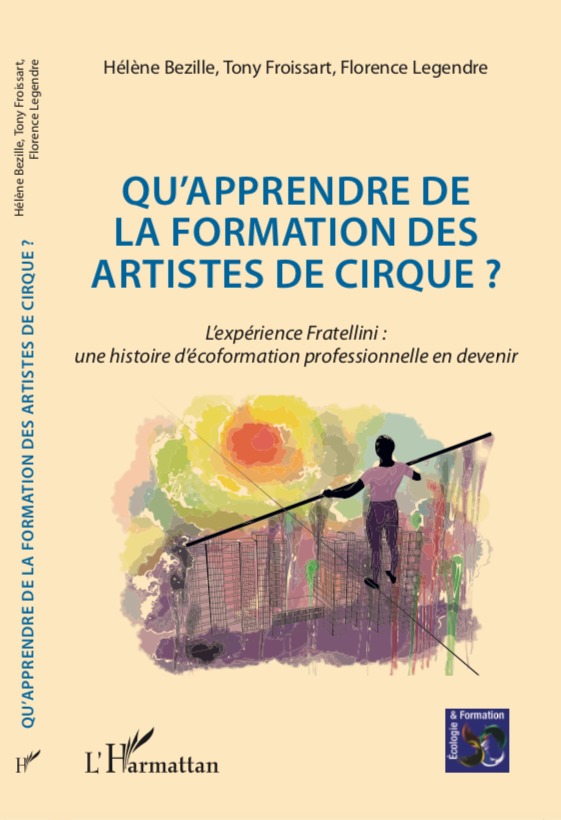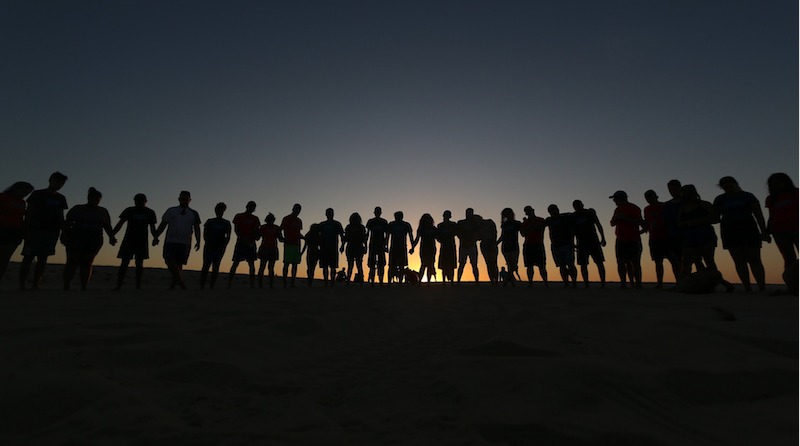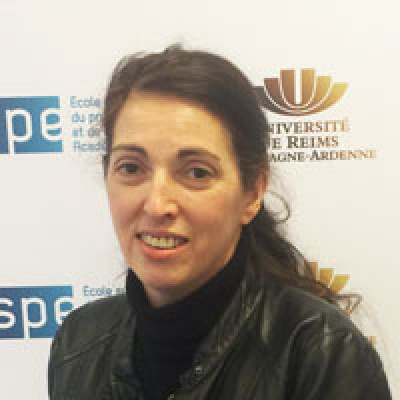The CIRRC Interdisciplinary Circle of Regional Research on Circus
In the continuing series titled Adventures in Circus Research curated by academic, author, and educator Alisan Funk, we will explore the depth and breadth of circus academic research around the world. By featuring circus researchers, we give them the space to explain the nature and significance of their research directly to the circus community, and to highlight the practical impact of their research on the circus world.
Dr. Florence Legendre is part of a team of researchers that research how people within circus learn to be part of their professional communities, especially how students in professional schools learn about risk and risk management in circus arts, and how circus educators learn to teach circus arts. France has approximately 500 circus schools, including recreational, pre-professional, and professional training. Because her research is in the field of sociology, it always explores the relationship between individuals and the society they live in. Research from this team tries to understand the culture of circus instruction in different educational settings. Understanding how circus culture is being taught has illuminated positive and negative habits of teaching culture, which then enables circus organizations to retain or change those methods of teaching. The research that Florence and the CIRRC are conducting has significantly contributed to how circus education and circus teaching is understood and studied in France, and across Europe. They publish their research in academic journals and books, but also have worked on FEDEC projects that result in open-access publications.
This is the story of the development of CIRRC, an interdisciplinary group of circus researchers in the Champagne region of France. It is the spring of 2011, at the University of Reims, and Delphine Lafollie, Vincent Grosstephan and myself, Florence Legendre, are having lunch together. We do not know each other very well; Delphine and I are both newcomers to the university as teacher-researchers. We are all part of the same research laboratory, the Center for Study and Research on Employment and Professionalization (CEREP) at theUniversity Reims Champagne Ardenne, France, but it is circus that brings us together. Vincent is responsible for an amateur circus school, Delphine takes circus classes, and I have just begun to discover circus performance with my recent move to Chalons en Champagne, the home of the National Center for Circus Arts (CNAC). I have never practiced at-risk sports, so I am particularly impressed by the way that circus artists commit themselves to physical challenges!
Together, we wonder about how risk is taught and learned in circus training schools.
We come from three different scientific disciplines: Delphine studies the emotional dimensions related to risk taking (her dissertation studied alpine mountain guides), Vincent explores the activities of physical education teachers, while Florence, an educational sociologist, researches the teaching profession. What brings us together as researchers is a common interest in how knowledge is transmitted. Together, we wonder about how risk is taught and learned in circus training schools. Thus, our research group The Interdisciplinary Circle of Regional Research on Circus (CIRRC) was born.
The first question our group addressed was about the of risk management in circus schools. For that reason, our group was originally called the Circle Interdisciplinary Circle of Research on Risk in Circus. We began by circumscribing and delimiting (i.e. defining) the object of our research: risk in circus education. Since the risk is distinctly subjective (what is risky for one may not be for another) and context-dependent, we focused on the relationships that students and educators have with risk. But risk is also an integral part of nearly every aspect of circus arts. We therefore also considered the socio-historical context of how circus arts and circus education became “professionalized” in France. Tony Froissart, new member of our research group, has significantly contributed to the social and historical contexts of circus development in France through his expertise as a sports historian.

With the financial support of the CEREP and the University of Reims Champagne Ardenne from 2012, the collective began our first project researching the transmission of risk-taking in vocational circus schools in France. We were warmly welcomed to conduct our research at the National Circus School of Rosny-sous-Bois (ENCR) and the Fratellini Academy. For this initial project, we observed within the schools, filmed training sessions, and conducted interviews with students, teachers, and with school principals. And of course, we also read all of the published material we could find about circus in France – which led us to discover the emerging academic field of circus studies! Although there are many publications that discuss circus, more are in the fields of aesthetics or art history than in the social sciences and humanities. Yet, several publications by sociologists resonated with our research, and we found that social science research on circus in France already existed! We reached out to those researchers, and were able to meet them in December of 2012 during an exchange day organized by Hors Les Murs in Paris. This network will continue to grow, and we are now all part of the CCCirque (Collective of Researchers on Circus, a more formal organization than our previously informal meetings).
We distributed the results of our first analysis on risk to the educational teams at the schools: that the transmission of risk-taking in schools is as central as it is invisible. We then invited teachers to discuss risk, an aspect of their work which they implement without really specifying it, to provide an opportunity for professional reflections. This resulted in several of the publications listed at the end of this article.
At the beginning of 2013, we were asked by the European Federation of Circus Schools (FEDEC) to participate in an ambitious project, INTENTS, that aims to define and understand the circus arts profession as a whole in order to better inform the circus artist training sector, including professional circus school teachers, continuing education and the production of teaching tools. Our initial research objective with CIRRC is therefore expanding; it now includes the profession as a whole. We are very excited. From the beginning, our research interests have been oriented towards the process of professionalization. We can now include the professionalization of teachers within the broader research category of the training of circus artists. In addition, discovering the profession through the professionals who practice it, across different European countries, opens up quite exciting prospects.
At this moment, our team at CIRRC is expanding. Claire Mattéï-Mieusset and Stéphane Brau-Antony are both CEREP activity analysis researchers , and Fabrice Thuriot (a member of another research laboratory within the university, the CRDT) specializes in cultural politics and union law. In the INTENTS project, we are joined by two experts from the Catalan Institute of Professional Qualifications (ICQP): Silvia Borell and Carles Domènech. With this expansion, we changed our name to our current title, the Interdisciplinary Circle of Regional Research on Circus.
Thanks to the INTENTS program, we have been able to delve deeply into the field of circus artist training, in all its international diversity. Between 2014 and 2017, we surveyed 19 schools from ten different countries. Of these, eleven offer secondary and/or vocational education, while the remaining eight offer undergraduate (BA) or other postsecondary degrees. We visited 16 schools (the other three were studied by meeting with their management and/or teachers during professional meetings at festivals or conferences). During each visit, we collected quantitative and qualitative data of various kinds: video recordings of teaching sessions, interviews conducted with teachers on their career path (71 in all), as well as with the team. management (31 in all). Finally, where possible, the school’s archives were consulted. We have also regularly participated in professional events, including in-service training sessions for project partners.
At the macro level, we identify the socio-historical and political issues affecting circus arts. At the meso level, we explore the sociological contexts of work and employment.
The research has been positively received by professionals, who are able to better understand the sector as a whole and grasp, at the international level, just how much diversity exists, and how much unifies the sector overall. Based on our data and the expertise of the ICQP, the report presents a repository of professional skills on the European model and a dive into the reality of the profession: the different types of schools, the paths and profiles of teachers, technical and transversal skills, etc. One of the ways that the CIRRC presents this information is through Vincent Grosstephan’s speeches on pedagogic engineering issues in the pilot training modules organized by FEDEC, which have been ongoing since 2014.
From a research perspective, we have developed an original, interdisciplinary approach so that we can better grasp the details of a profession in the process of being “professionalised,” through the development of institutional structures and professional development of those within the sector (including, but not limited to, artists and teachers). Starting from our individual fields in history, the law, the sociology, and the analysis of work-oriented activity, we have combined our disciplines to understand the professional dynamics at work on different levels of analysis.
At the macro level, we identify the socio-historical and political issues affecting circus arts. At the meso level, we explore the sociological contexts of work and employment. Finally, at the micro level, we try to understand the work activity of teachers in circus schools. Throughout each level, we look at the ways that professionals are asked to differentiate themselves, and also how they are asked to fit into specific work, educational, and social milieus. Articulating these different levels of analysis allows to better understand the complex processes that influence an emerging professional group. Our first analyses have been published as books and book chapters, which can be found at the end of this article.
Finally, we are currently working collectively on a publication (estimated release date 2020) that will bring together our interdisciplinary perspectives through an analysis grid, so that the reader can better understand the processes that affect both how circus artists are trained and the emerging profession of circus teachers. In addition, this publication is closely interrelated with professionals: not just research “on”, but also “for” and “with”. The book will appeal to readers who want to understand the complexity of the processes of professionalization in the field of training of circus artists and beyond.
Publications by members of CIRRC: Bajomi I., & Legendre F. (2019). "Imre Baross School. Emergence and institutionalization of a circus artist training in Hungary ." In T. Froissart, C. Thomas (Eds.), Circus Arts and Artistic Physical Activities. Reims: Épures.Grosstephan, V. (2018). Training in risk taking in circus schools: an exploratory study. Carrefours de l'Education, 46, 177-190. https://www.cairn.info/revue-carrefours-de-l-education-2018-2-page-177.htm Grosstephan V. (2019). The use of the historico-cultural theory of activity for the analysis of the design of a system of continuous training of teachers in vocational and higher circus schools. In T. Froissart, C. Thomas (Eds.), Training in circus arts and artistic physical activities. Reims: EPURE, Col. Sports, actors, performances. Legendre, F. (2014a), "The transmission of risk management in circus schools in France", SociologieS, Dossier "The transmission of the profession",<https://sociologies.revues.org/4554>, put online on March 07, 2014. https://journals.openedition.org/sociologies/4554 Grosstephan, V., Legendre, F. & Brau-Antony, S. (2013), "Is risk training possible? The case of vocational training of Circassians," Proceedings of the Biennial of Education, Training and Professional Practices Education, training, professional practices. Transmit? Paris (CNAM), 3-6 July. https://halshs.archives-ouvertes.fr/halshs-00800064/file/v-grosstephan-f-legendre-s-brau-antony-com-n-218-atelier-30_1363777393295.pdf Hélène B., Froissart, T. and Legendre, F. (2019). What to learn from the training of circus artists? The Fratellini experience: a history of professional ecoformation in the making. Paris: the Harmattan, Col. Ecology & Training. Lafollie, D. (2015), "Personal Risk Management of Higher Education Circus School Students: An Exploratory Study", eJournal of Research in Education on Intervention in Physical Education and Sports, n ° 35. https://www.researchgate.net/profile/Delphine_Lafollie/publication/283214689_Les_dimensions_personnelles_de_gestion_du_risque_d'etudiants_en_ecoles_superieures_de_cirque_une_etude_exploratoire/links/562e5edf08aef25a24443a2b.pdf Legendre, F. (2016), "Becoming a Circus Artist: Learning about Risk", Gender and Society Work, 36/2016, pp 115-131. https://www.cairn.info/revue-travail-genre-et-societes-2016-2-page-115.htm# Legendre F. (2018). Socio-historical approach to the gender segmentation of a professional group. The case of teachers of professional circus schools in Europe. In S. Divay (Ed.), Variations on the theme of gender in professional groups. Toulouse: Octares. Legendre F. (2019). "Structuring and homogenization of the training of circus artists in Europe". In M. Cordier, A. Dumont, E. Salamero, M. Sizorn (Eds.), Professional career in circus arts. Reims: Épures.
Feature photo credit: Pixabay.All other photos courtesy of Florence Legendre...
Do you have a story to share? Submit your news story, article or press release.







